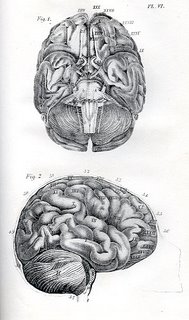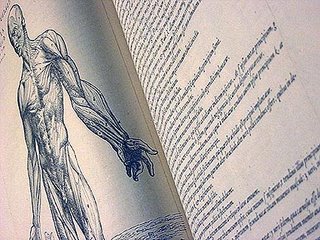This is something I wrote in my first year of
It is so strange to learn the body as a material thing, a rather loose and squishy conglomeration of material objects. So many things that I “knew” before—bone, heart, brain, womb, stomach, cancer, skin—I have held in my hands: cold, fleshy, firm. They cease to be feelings or experiences. They enter the solid world, into the category with rock, mud, wood, steel, wires. The body can be cut open and physically manipulated with the hands, and physical manipulation changes function.
And the body acts just as the machine that it is. Neuron depolarizes ==> Myofilaments slide across each other ==> Bone pivots ==> I move my arm. Birth and death are similarly mechanical: both reducible to flow charts, both preventable by surgical intervention or ingestible tablets which interrupt the mechanism. Even the brain (that mysterious, soft, gray organ) is shown to be a composition of billions of cells. And these cells do just what neurons do: depolarizing and repolarizing. Nerve cells do not know and they don’t care. They just depolarize and repolarize in response to stimuli. Not very magical.
No, there is no inherent compassion or fear in the study of the human as a thing. There is only the thing itself: a highly ordered group of atoms that maintains its order by breaking down organic molecules and moves itself grossly with a system of levers and pulleys.
The problem with this learning of the body as a thing is that it bears no resemblance to anyone’s experiences of their own body. The mechanical body of the medical lecture hall is true, but it isn’t real. It has little relation to anything of value or even anything in the real world. The real body is an experience not a thing. The real body is sacred. No person I will ever know has that mechanical abstraction that I am spending four years to learn. The material body is nothing but a lie, a construction that has fortuitously proven to be a useful model for preventing death and illness.
I remember the day that we dissected the pelvis in anatomy. I went home disgusted because I had seen with my own eyes that the vagina is only a muscular tube lined with stratified squamous epithelium set between the urinary bladder and the rectum. How could I have set so much expectation and mystery into something so banal? And then it was the heart. No, I knew better than to think of the heart a s the seat of emotion (we all know now that the limbic lobe is the seat of emotion)—but what does this muscular lump have to do with the experience of that thing that surges and thumps in my own chest? Then came the brain. I have taught the brain to students of my own. I have told all the useful lies. I have watched their mouths drop open as I move through the
s the seat of emotion (we all know now that the limbic lobe is the seat of emotion)—but what does this muscular lump have to do with the experience of that thing that surges and thumps in my own chest? Then came the brain. I have taught the brain to students of my own. I have told all the useful lies. I have watched their mouths drop open as I move through the
The objective body is an invention of doctors, anatomists, and biochemists. It is as abstract as mathematics. It never lived. Only scientist and doctors believe in it. I have had a body for 23 years but this bioelectrical, mechanical object has only grown into my body over the last few years. Before I only knew my body as a real, raw experience. It is good we study the mechanical abstraction. But approach with caution! It has very little to do with humans or their bodies. The flesh and blood is more than what doctors and scientists can ever know.
-8/24/01


1 comment:
Have you read Frankenstein? I think you'd enjoy it. I cheated and listened to it. You can get a free reading at http://www.librivox.org/ .
Good to hear you are still alive.
Post a Comment